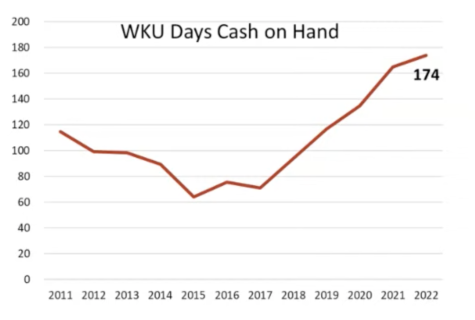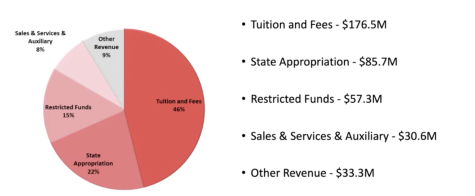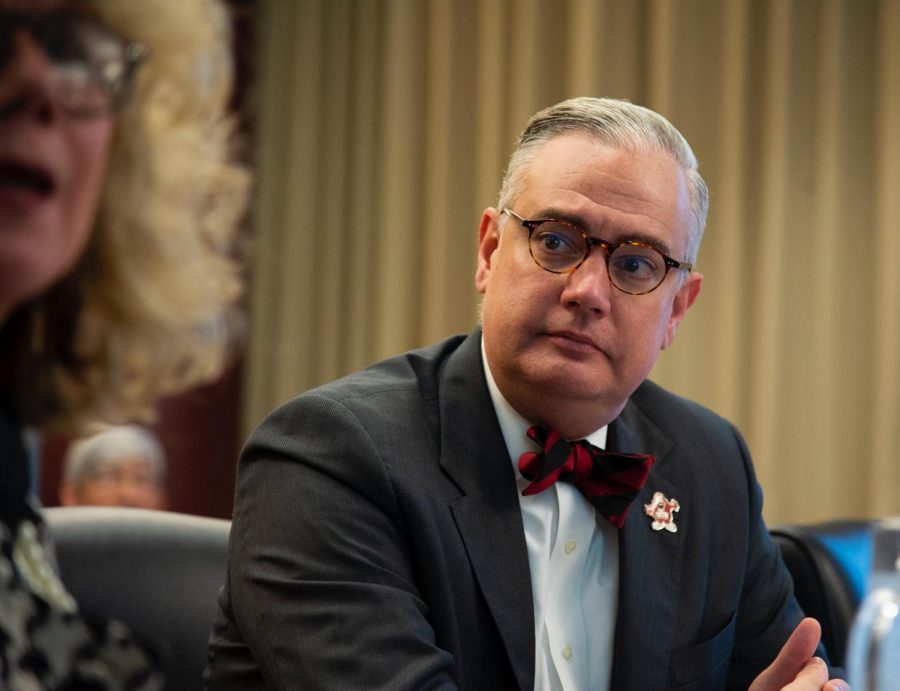Regents discuss proposed FY 2023 budget, address inflation concerns in final semester meeting
WKU President Timothy Caboni listens to Vice President for Strategy, Operation and Finance Susan Howarth speak during the Jan. 31, 2020 Board of Regents committee meeting.
May 5, 2022
WKU’s Board of Regents met Thursday for their second quarterly meeting of the semester, taking time to discuss how inflation affects the university’s financial decisions.
The board was presented with a development update regarding the 2023 budget, and Staff Regent David Brinkley and Faculty Regent Shane Spiller both raised concerns regarding the impact inflation has had on the WKU community. According to the Bureau of Labor Statistics, the inflation rate is currently 8.5%, the highest it’s been since 1981.
According to the budget presentation given by Susan Howarth, executive vice president for strategy, operations and finance, the university is carrying approximately $130 million in on-hand cash, or 174 days of cash. Haworth mentioned that the recommended amount of days is 110.
Spiller noted that the university’s cash-on-hand situation “is tremendous progress,” but voiced his concern regarding inflation rates and the cost of living for WKU employees.

“I am tremendously concerned about some of our staff, and even a few faculty having food scarcity and housing scarcity as we move forward,” Spiller said, mentioning that local food inflation rates are “over 20-30%” and apartment rent has gone up “20-35% in the region.”
“How do I go back to those faculty and staff, who are dealing with that kind of scarcity, and say ‘it’s all okay, we’ve got more cash on hand’? I’m struggling with that,” Spiller continued.
President Timothy Caboni responded to Spiller’s question by iterating that the “budget no-no” is to spend one-time dollars on recurring expenses.
“Because once you spend them, they’re gone,” Caboni said. “Cash-on-hand is a great tool for stability, and it demonstrates that we were well under where the rating agencies were, now we are at a place where we are over. But these are not resources you can spend on recurring expenses.”
Caboni went on to say that inflation continues to pose a challenge to universities nation-wide, and it is not clear if the trajectory will change in the future.
“I am not sure, as I’m not sure anyone is sure, about what happens with inflation,” Caboni said. “It seems more permanent than folks were hoping… we have to watch, and we have to watch carefully.”
Brinkley suggested that some of the university’s on-hand cash be used towards personnel as a means to offer relief during the turbulence brought on by inflation.
“What if we took $4 million? $4.5 million? $3 million? $3.5 million? Pick a number – you all are great at that – and invest it in one-time relief for the cost of living?” Brinkley said.
Brinkley said multiple people have talked to him in the days leading up to the board’s meeting to voice concerns regarding living costs.
“They walk up and voice the same concerns – ‘my rent has gone up 20%, groceries are up 10%, I can’t buy things,’” Brinkley said. “It’s not that they need to change their lifestyle – if we are in a position, would this not be a good strategic investment?”
Brinkley went on to say that he agreed with Caboni in that one-time dollars should not be used to fix salary issues, but he is “extremely concerned about the cost of living for this year.”
Caboni said he thought Brinkley’s proposal was “a great idea”, and that it is a conversation for the Budget Executive Committee to have as it continues working on the final budget, which is to be presented to the board on June 10.
“I think it makes perfect sense, and Regent Brinkley, I appreciate the thought and the creativity,” Caboni said. “You had floated this idea to us individually and I do think it’s something we need to take a look at.”
Caboni spoke with the media after the meeting and fielded more questions regarding how WKU will continue to tackle rising inflation rates. Caboni said the university needs to avoid saddling students with the burden of inflation.
“We’re focused on what we can do, and we’re looking at ways in which we can maximize our budget to relieve the expenses that are going to increase for all across this campus,” Caboni said. “The challenge we face is that everything costs more. It costs more to feed our students, it costs more to keep our buildings cooled and lit. What we’re trying to do is take one-time dollars and use that to smooth that inflation; hopefully this is not a permanent situation.”
In regards to the idea of using cash-on-hand to fund relief for personnel, Caboni said that the university needs to be strategic when using scarce resources, and it is up to the faculty and staff senates and the Budget Executive Committee to best deploy those resources.
“This is not a single-person decision,” Caboni said. “I think whatever we do, we need to have, top-of-mind, taking care of our faculty, our staff and also our students.”
Academic Affairs Committee
The bulk of the meeting included the approval of items already presented before the Regents in their April 15 committee meeting.
The Regents approved the creation of a supply chain management graduate certificate that will operate out of the Gordon Ford College of Business starting in the fall.
The Board of Regents approved faculty Emeritus status to James Gary for Engineering and Applied Science. He has served in various roles including department chair and taught a wide variety of courses in support of the programs in the School of Engineering and Applied Sciences.
Additionally, Staff Emeritus status was awarded to Ladonna Hunton, associate vice president for academic budgets and administration. She has served as a part-time faculty member and has provided her expertise on several committees.
Finance and Budget Committee
The Regents unanimously approved two budget and finance action items. The first consisted of personnel changes previously discussed during the April 15 committee meeting. These items include position and salary adjustments across the university.
The second item, presented by Howarth, outlined the state of the university budget and announced goals for the 2023 fiscal year. WKU will see its budget increase by $7,770,330, or 2% over the previous year.

Haworth said the Budget Executive Committee identified three major budget recommendations: evaluate increases to fixed costs — such as utilities and facilities — and offset inflationary loss with one-time payments, distribute a 2% salary pool in January under BEC supervision, and a “commitment to consider” funding high-priority personnel positions with money from the Strategic Initiative Fund.
Haworth announced that WKU has fully implemented its Resources Allocation, Management and Planning (RAMP) model of budget governance. This model aims to “promote full campus transparency” by including Faculty Senate, Staff Senate, Student Government Association and other committees in budget design discussions.
WKU is projected to have a first time, first year enrollment class of 2,908 in 2023. The total student headcount is projected to be 16,492, compared to 16,750 students in Fall 2021. This continues WKU’s decade-long drop in enrollment numbers.
Haworth said the 1.19% increase in tuition brings the three-year tuition increase average to 1.06% annually. Tuition was not increased in 2021, but increased by 1.75% in 2022.
In June, the BEC will meet to finalize the budget and seek approval from the Council of Post-Secondary Education.
Student Affairs
The American Society of Civil Engineers student chapter came before the Regents to discuss their recent success in a student-designed concrete canoe competition.
Their canoe, the “Mon Row,” named after bluegrass legend Bill Monroe, placed first in regional competition. They explained to the board how they were able to achieve that by using a concert-like strategy to build the canoe effectively.
The ASCE won first place in canoe technical presentation, female sprint, female slalom races, male sprint, male slalom races, the canoe final product prototype, concrete canoe overall, concrete corn hole, canoe technical paper, mystery design and the steel bridge aesthetic.
They won second place in technical paper and survey.
Executive Affairs
Cheryl Stevens, former dean of Ogden College and later acting provost, was awarded with provost emeritus status. The board thanked her for her contributions during her time at WKU.
“During her tenure as Acting Provost, Dr. Stevens successfully navigated WKU through the COVID-19 pandemic and helped facilitate the switch to fully remote learning. She provided the students, faculty, and staff with encouragement, direction, and support during uncertain times,” the agenda states. “As the Dean of Ogden College, Dr. Cheryl Stevens established the Department of the Psychological Sciences and the School of Engineering and Applied Sciences, supervised the design and construction of Ogden College Hall, and completed a total redesign and renovation of Kelly Thompson Hall.”
Stevens was also recognized for her role leading the Women in Science and Engineering group and exemplifying the values of Ogden College — to “Empower, Connect, Serve.”
She led the Women in Science and Engineering group, fostered a shared governance throughout the college, and developed a vision that unified the college. She exemplified the values of Ogden College, which are to “Empower, Connect, Serve.”
The Regents also approved the renaming of the ROTC Physical Training Field in honor of two 1973 alumni, Robert “RB” and Bobbye Belwood Brown. RB was the commander of the Boor Cadet during his senior year and was a distinguished military graduate. Bobbye was captain of the Rebelettes drill team.
“The Browns’ are very passionate about sustaining the mind, body and spirit, they believe that healthy habits should have an increased focus in society,” the agenda item states. “It is only fitting that this philanthropic opportunity be given to them to recognize their philanthropy and support for the ROTC program.”
A closed session heralded the end of the meeting. According to the agenda, the session is provided by KRS 61.810(1) “for discussion of proposed or pending litigation against or on behalf of the University.”
The regents will rejoin for a special called meeting on June 10 for final approval of the budget.
Content Editor Jake Moore can be reached at [email protected]. Follow him on Twitter @Charles_JMoore.
Editor-in-Chief Michael J. Collins can be reached at [email protected]. Follow him on Twitter @MJCollinsNews.
News Reporter Makaio Smith contributed to this article. She can be reached at [email protected]. Follow her on Twitter @MakaioSmith.
























